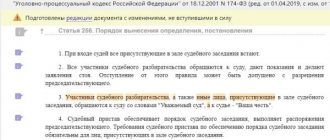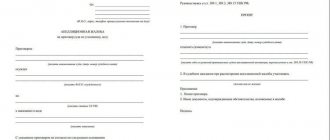When summoned to a judicial authority, a person is obliged to appear or declare valid reasons for absence. The presence of all participants in the process is necessary for the procedure to proceed correctly. Liability is provided for the failure of a witness to appear in court in a criminal case. It is worth knowing what consequences will follow if you are absent from a court hearing.
What is the danger of a witness failing to appear in court in a criminal case?
Most people understand that victims, defendants, and witnesses must be present at trial.
None of them has the right not to appear at the meeting, the time of which is set in advance. The witness should also be in the courtroom, because he plays an important role in the case and can even direct the investigation in a different direction. Let's consider what can happen if a person does not appear at the trial. When a person's testimony is significant, the case may be postponed to another date. In other cases, they have the right to continue the trial even if the summoned witness is absent. As a rule, testimony is not made public in his absence. But if the citizen has failed to appear many times, the prosecutor will have the opportunity to ask for previous evidence to be read out. In this case, there will be a reference to extraordinary circumstances. However, the final decision on this point is made by the judge.
Important! The defense may object and disagree with the prosecutor's opinion. Because disclosing testimony without the person himself is a gross violation.
Law enforcement agencies may believe that the failure to appear occurred because the person has something to hide. This means that representatives of the law will be more interested in the citizen. That is why it is better not to hide from court proceedings and remember the duties and rights of a witness. Then the participant in the case will not have any problems, and he will only be required to give testimony.
Consequences of the victim’s failure to appear when called
Lawyer Antonov A.P.
Part 6 art. 42 of the Code of Criminal Procedure of the Russian Federation, duplicates that provided for in paragraph 2 of Part 2 of Art. 111 and art. 113 of the Code of Criminal Procedure of the Russian Federation, the possibility of applying coercive measures in the form of a summons to a victim who evades appearing before an investigator (inquirer, etc.), in court (to a judge). In particular, it says: “If the victim fails to appear when summoned without good reason, he may be brought in.”
We explained the concept of “challenge” in relation to the characteristics of clause 1, part 5, art. 42 of the Code of Criminal Procedure of the Russian Federation.
The term “failure to appear,” which the legislator used here, should be interpreted as the absence of the victim at the place appointed by the investigator (investigator, etc.), court (judge) on the established date and time. The victim can come at another time (day) or meet with the investigator (inquiry officer, etc.), judge in another place. In this case, no-show will still occur. Another thing is that if the investigator (inquirer, etc.), when meeting at another time or in another place, considers it possible to carry out a procedural action with the participation of the victim and is able to solve the problems facing him through the required action, he has the right not to apply a measure of procedural coercion to the victim, which is sanction for failure to appear.
When the investigator (inquirer, etc.) does not consider it necessary to conduct a procedural action on that day and time, as well as in the place where and when the victim who did not appear earlier met him, the victim can be brought to the place of preliminary investigation at a convenient place for the investigator (investigator, etc.) time and, accordingly, day. The court (judge) has the right to do the same.
From the text of Part 6 of Art. 42, as well as part 1 of Art. 188 of the Code of Criminal Procedure of the Russian Federation it follows that the failure of the victim to appear is possible only for good reasons. “Respectful” means “sufficient to justify something,” “reasonable.” A reason is a circumstance that causes, explains someone’s actions, actions, a basis, a pretext for some action, in our case for inaction.
The victim is prohibited from not appearing before the investigator (interrogating officer, etc.) or the court (judge) at the appointed time (at the indicated place) without sufficient explanation. The following are recognized as valid reasons for the failure of a victim to appear when called by an investigator (inquirer, etc.) to court (to a judge):
1) natural disasters, catastrophes;
2) an illness that actually deprives the victim of the opportunity to appear;
3) death of close relatives of the summoned victim;
4) illness of a family member or the presence of young children when it is impossible to entrust someone with caring for them;
5) late receipt or failure to receive a summons;
6) long unforeseen interruption in traffic;
7) other significant circumstances depriving the victim of the opportunity to appear at the appointed time.
A victim who fails to appear (usually fails to appear twice) when called without good reason may be subject to arrest. In other words, applying a summons to a victim who fails to appear when summoned is not an obligation, but the right of the investigator (inquiry officer, etc.), the court (judge).
Otherwise, the drive referred to in Part 6 of Art. 42 of the Code of Criminal Procedure of the Russian Federation is a coercive measure applied in accordance with the requirements of Art. 113 of the Code of Criminal Procedure of the Russian Federation to victims in the event of their failure to appear (usually twice) without good reason when called by an investigator (inquiry officer, etc.), court (judge).
The investigator (inquiry officer, etc.), as a rule, entrusts the execution of the investigation to the internal affairs body. The procedure for implementing the considered measure of procedural coercion by internal affairs bodies is as follows.
The received decision to bring the victim is considered by the head of the internal affairs body or the person performing his duties.
In this regard, he organizes a check of the information specified in the resolution about the victim to be brought in, and also takes measures to establish his actual location.
Then an employee or group (squad) of police officers is allocated, taking into account the investigative jurisdiction of the criminal case in which a decision has been made to bring the victim. The latter are obliged to reliably establish the identity of the victim being brought in based on the information available in the decision to bring him in (last name, first name, patronymic, year of birth and location).
Upon identification of the person to be brought in, a police officer or a senior group (squad) of police officers announces to him, against his signature, a decision to bring him in. If the victim refuses to sign by a police officer or the senior group (squad) of police officers executing the arrest, a corresponding entry is made in the arrest order.
The victim subject to bringing is also explained his right to legal assistance, the right to the services of an interpreter, the right to notify close relatives or close persons about the fact of his bringing, the right to refuse to give an explanation.
Police officers carrying out the arrest do not have the right to allow actions that humiliate the honor and dignity of the victim. At the same time, they are obliged to be vigilant in order to exclude cases of the victim evading appearance at the place of call or causing any harm to himself or others.
Upon execution of the arrest order, the police officer who carried it out receives a receipt from the investigator indicating the time of execution.
In accordance with the law, the victim cannot be brought in at night (from 22:00 to 6:00 local time), except in urgent cases.
It is recommended to consider the following situations as urgent cases:
1) factual grounds for using the drive suddenly appeared;
2) there are circumstances that allow us to believe that refusal to immediately carry out a summons may lead to the loss of information relevant to the criminal case.
If the effectiveness of the drive does not change when it is carried out in the morning of the next day, then this procedural action cannot be considered urgent. It is prohibited to carry out such a drive of the victim at night.
The bringing of the victim, as determined by the court, as a general rule, is carried out by bailiffs to ensure the established procedure for the activities of the courts. However, the law does not prohibit bailiffs from contacting the internal affairs body for assistance in bringing the victim.
In Part 6 of Art. 42 of the Code of Criminal Procedure of the Russian Federation mentions one of the measures of criminal procedural liability, which may follow the failure of the victim to appear when called without good reason. We are talking here only about the drive. Meanwhile, the law provides for two more similar measures: an obligation to appear (Article 112 of the Code of Criminal Procedure of the Russian Federation) and a monetary penalty (Articles 117 and 118 of the Code of Criminal Procedure of the Russian Federation). Any (and in some cases several) of the above-mentioned measures of procedural coercion may be applied to a victim who fails to appear in court when summoned by an investigator (inquiry officer, etc.) without good reason.
Sincerely, lawyer Anatoly Antonov, managing partner of the law firm Antonov and Partners.
Still have questions for your lawyer?
Ask them right now here, or call us by phone in Moscow +7 (499) 288-34-32 or in Samara +7 (846) 212-99-71 (24 hours a day), or come to our office for a consultation (by pre-registration)!
Good reasons
In some cases, the witness does not want to hide from the court, but actually cannot come to the hearing. Therefore, you should know the good reasons that justify a person in such a situation.
Causes:
- Illness of the summoned citizen or his loved one, which makes it impossible to appear in court.
- Lack of transport links, accident.
- Various man-made disasters.
- No subpoena.
- Receive a summons on the court date or later.
- The need to leave for work or serious personal reasons.
Please note that the reasons described above will need to be confirmed with documents. If a person simply forgot about the meeting or did not want to participate in it, then he will have to bear responsibility for his action. Also, a citizen has the right to be required to appear in court, and for this they can even turn to law enforcement officers.
Who can be summoned for questioning
Any person who has information about a crime committed is subject to interrogation, unless this contradicts the Code. The victim and the suspect (accused) are interrogated without fail, since this is also necessary to protect their rights. We will tell you more about the procedure for interrogating a victim under the Code of Criminal Procedure of the Russian Federation in a separate article here. In addition, the summons can be sent:
- to the witness;
- understood;
- to an expert;
- translator;
- to the investigator;
- to the investigator.
Persons with mental illness or physical disabilities may also be called upon to testify if they are able to adequately assess the situation and express their thoughts.
The summons form for questioning is available at this link
Liability provided
Considering the fact that the absence of a witness affects the quality of the meeting, they have the right to hold him accountable. Therefore, if a citizen does not appear for the case, then he will face consequences.
What could be:
- They will be forcibly brought to a court hearing.
- A fine will be imposed for absence from the courtroom. If a civil case is being resolved, then you will have to pay 1,000 rubles. Witnesses in criminal proceedings will pay 2,500 rubles.
At the moment, there is no criminal liability for the fact that a person does not appear at the meeting. But a person must still appear in court if there are no reasons for absence. Some citizens are looking for ways to avoid punishment for failure to appear. It can be said unequivocally that liability will not arise only if there are legislative grounds for canceling the fine. Therefore, now we will consider in what situations a person will not have to answer to the law.
Agenda information
The summons must contain the following information:
- Recipient's name and address;
- purpose of the call;
- Full name of the investigator;
- address of the institution and room number where the interrogation will take place;
- date and time of appearance at interrogation;
- measures taken against the summoned person in case of failure to appear.
A sample summons for questioning can be downloaded here
Methods of transmitting notice
A notice of summons for interrogation is delivered to the addressee’s place of residence and handed to him personally. In his temporary absence, the summons is transmitted to:
Helpful information
In order to assist the investigation and protect your rights, you need to know how to behave during interrogation. You need to be confident and refuse to give evidence if you do not remember it in whole or in part. If you are not given a protocol to sign, it is not valid. You can find out more tips in the article here
- a close relative who has reached the age of majority;
- to an administrative employee at the place of work;
- to other persons (organizations) on behalf of the investigator.
A receipt is taken from the recipient, which indicates the date and time of transmission of the notice. Temporary absence means the intended return of the addressee within 24 hours or within a period sufficient for a timely visit to the place of interrogation. Also, the summons can be sent by mail, telephone, via the Internet and other means of communication with the obligatory indication of details. A summons for questioning by telephone without a summons cannot be considered lawful.
Subpoena delivery on behalf of the investigator
The legislation does not establish the form of instructions sent to third parties to transfer the subpoena to its destination. It is still better if it is in writing. The order can be entered directly into the text of the agenda in a separate column. It is also not required to accompany it with the issuance of a corresponding resolution. However, the need for this may arise when certain powers are transferred to other investigative bodies.
Special procedure for calling for interrogation
In relation to some persons, separate rules for serving a summons apply:
note
It is important to distinguish between the concepts of interrogation and interrogation. The main difference is that the materials used during the survey cannot be used as evidence.
- Persons under 16 years of age are summoned for questioning through:
- parents (guardians);
- management of the educational institution;
- administration at the place of work.
- Those in custody and serving time in places of deprivation of liberty are notified of the summons by the administration of the correctional institution.
- Military personnel are notified by the head of the military unit.
- Persons located abroad may be called upon to testify only with their consent. They are not subject to criminal or other prosecution for 15 days from the moment when the investigative need for their presence has ended.
- Those detained outside the Russian Federation are transferred for questioning by an official of a foreign state in accordance with international agreements.
Is it possible to avoid punishment
By law, all participants in the case, including witnesses, must appear in court.
The agenda is sent in advance, so the person will have the opportunity to prepare for the meeting and free up time for it. If for some reason a citizen cannot be present at the case, then he must inform the court about this. You can submit a petition to change the dates or time of the meeting. The court often accommodates people halfway in such requests. As a rule, it is possible to postpone the case for a month, so it will not be possible to delay the process for a long time. Therefore, if a person does not want to appear due to fear, laziness or other disrespectful reasons, then it would be unreasonable to change the deadline.
There will be no punishment in the case where a citizen was unable to come for a serious reason. If he can confirm this fact with official papers, then he will not be held accountable. Please note that there is no specific list of reasons. However, it is important that the reason for the absence clearly indicates the impossibility of appearing in court.
Judicial notice
The legal term is used in relation to the persons involved in the case, in contrast to the “judicial summons”, which is applied to specialists, experts, interpreters and witnesses. A judicial summons is one of the forms of judicial notice, which specifies the time, date, place of a meeting or other procedural actions. When those interested in the trial are summoned, copies of procedural documents are sent along with a notice in the form of a registered letter or summons.
In the event of a summons for the purpose of conducting a conversation with the parties or other persons, a corresponding notice, other than a summons, is sent.
A sample summons and other notices are developed in accordance with the Instructions for Judicial Processing in the District Court. The document is approved by the Order of the Judicial Department at the Supreme Court of the Russian Federation (dated April 29, 2003).








